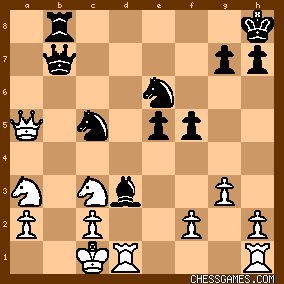| Phony Benoni: <PaulMeysman> It can be a big mistake to give up a pawn in the opening. But it can be an equally big mistake not to give one up! Playing a reasonable gambit should provide some sort of advantage, such as a lead in development, a weakness in the opponent's position, having their king caught in the center, etc. A sound gambit usually provides an initiative, the ability to dictate the course of play. Many players approach gambits with the wrong attitude by focusing on getting their material back. A player with that sort of attitude should probably avoid playing gambits. Instead, the gambit player should be focusing on using their initiative to exploit their advantages while not giving the opponent time to use theirs.. That was something I often had trouble with, deciding whether to keep attacking or "cash in" and regain materials at the cost of the initiative. As for proving the soundness of Black's play, well, that's something else which would give me trouble. I was always an instinctive player rather than a thorough analyst. But I will say this. If White is up the exchange and two pawns and has to find a "strange" move like <23.d3> to survive, then Black's attack is probably sound. Cranking up my own computer, it appears White may have been scared off <23.d3> by the possibility of <23...Bxd3!> 
click for larger viewThe bishop is immune, as 24.Rxd3 hangs the rook on h1 while 24.cxd3 allows 24...Qb2#. Meanwhile, Black actually has the threat of 25...Ra8 trapping White's queen. (That's what active pieces will do for you.) My computer says the best White can do is giving away a knight on b5, when after M25...Bxd5 26.Nxb5 Qxb5 27.Qxb5 Rxb5> 
click for larger viewWe are left with an ending of R+P vs. 2Ns which is probably somewhat better for Black, but a draw wold be thelogical outcome. And the attack is over. Now, White was a master-level player in a National Championship event; why would he play a simple blunder like 23.Re1 rather than going for this line? Probably because he was a master level player who saw the consequences of 23.d3, and wanted to do better. These unbalanced positions are hard for the defender, too. All of which proves nothing, of course. The game still has to be played. And I'm fine with that. Even if computers do "solve" chess some day, it's not going to spoil the game for us lucky people. They won't be doing anything human grandmasters haven't done for centuries. Besides, I know I'll never be able to remember all the analysis. And, hopefully, neither will my opponents. | 




